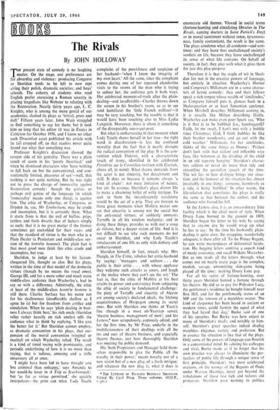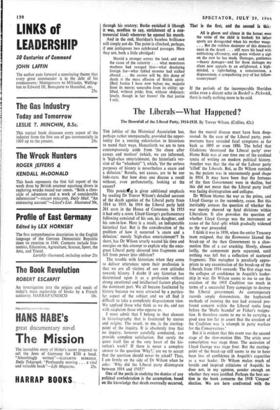The Rivals
By JOHN HOLLOWAY
rrinE present state of comedy is no laughing I matter. On the stage, our preferences are for absurdity and violence: producing Congreve or Sheridan tends to be left to new reps airing their polish, dramatic societies, and boys' schools. The cohorts of students who read English prefer exercising a Roman severity in placing tragedians like Webster to relaxing with the Restoration. Nearly thirty years ago, L. C. Knights, who is among the more genial of our academics, slashed its plays as 'trivial, gross and dull.' Fifteen years later, John Wain struggled to find something to say for them; but it took him so long that his editor (it was in Essays in Criticism for October 1956, and I know no other such Draconian case) published his article with its tail cropped off, so that readers never quite found out what that something was.
Professor Knights's discussion showed the severer side of his geniality. There was a plain touch of scorn in his 'purely theatrical,' and when he dismissed characters who 'have nothing to fall back on but the conventional, and con- ventionally limited, pleasures of sex'—well, that nothing is not quite nothing. But he was right not to press the charge of immorality against Restoration comedy: though the genius, or perhaps evil genius of the language (in which 'immorality' means only one thing), is against him. The ethic of Wycherley, or Congreve, or Dryden in, say, Mr Litnberham, may be crude and incomplete, but it is certainly there. What it starts from is that the evil of bullies, prigs, tattlers and fools dwarfs that of lechers simply as such; that it is no great matter if the former sometimes get cuckolded for their vices; and that the standard of virtue is the man who is a Plain Dealer (a Protestant and middle-class ver- sion of the honnete homme). The plain fact is that most good men think this ethic crude and incomplete, but true.
Sheridan, to judge at least by his liaison- chequered life, thought so also. But his plays, written in the time of that model of the domestic virtues (though by no means the royal ones), George HI, and for a more sober and much more middle-class audience than Wycherley's, had to say so with a difference. Admittedly, the ethic at least of the middle-class honnete honinte is still there. Charles Surface has his name not for his shallowness (insufferably shallow as I agree he is) but for freedom from artifice and simulation. When he says 'plain dealing in busi- ness I always think best,' his rich uncle (Sheridan relies rather heavily on rich uncles) tells the audience what to think by replying, 'I like you the better for it.' But Sheridan cannot employ, as dramatic convention in his plays, that sus- pension of the moral convention (virginal or marital) on which Wycherley relied. The result is a kind of timid toying with promiscuity, and periodic underlining of how it is no more than toying, that is tedious, amusing and a trifle unsavoury all at once.
'I might have been led to have thought you less criminal than unhappy,' says Amanda to her would-be lover in A Trip to Scarborough: but 'as far as virtue permitted,' she quickly interpolates—the prim can relax. Lady Teazle complains of the peevishness and suspicion of her husband—'when I know the integrity of my own heart' All the same, since the complaint comes during one of her repeated clandestine visits to the rooms of the man who is trying to seduce her, the audience gets it both ways. Her celebrated moment-of-truth after the plain- dealing—and insufferable—Charles throws down the screen in his brother's room, so as to see (and humiliate) the 'little French milliner'—it may be very touching, but the trouble is that it would have been touching also to Miss Lydia Languish. Moreover, there is about it something of the disreputably sauve-qui-peut.
But what is embarrassing in that moment when Lady Teazle shows herself in her true—the right word is discoloration—is less the confused morality than the fact that it nearly disrupts the radical convention of the play. It is the con- vention which Diderot, with a characteristic touch of irony, identified in his celebrated Paradoxe sur le Comedien (written with Garrick, above all, in mind). What drama demands from the actor is not sincerity, but detachment and skill. It does so because it remains always 'a kind of chant': not mere imitation of nature, but art. In essence, Sheridan's plays distort life to make a charming ballet of witty intrigue. To seek in them the incandescently revelatory would be the act of a prig. They are foreign to those great moments when Moliere makes one see that sincerity is among not the social but the anti-social virtues; or suddenly unmasks Tartuffe in all his virulent malignity; and in doing these things, provides us with not a coup de theatre, but a deeper vision of life. And it is not difficult to see why such moments do not occur in Sheridan, and why Lady Teazle's simulacrum of one fills us only with dubiety and embarrassment.
Sheridan himself, in fact, reveals why. Mrs Dangle, in The Critic, rebukes her critic-husband by saying: 'managers and authors . . . the public is their critic . . . with whose applause they welcome such attacks as yours, and laugh at the malice where they can't see the wit.' The fact is, that the ethic of Moliere at his best attains its power and consistency from subjecting the ethic of society to fundamental challenge: the piety of Tartuffe and sincerity of Alceste are among society's declared ideals, the lifelong acquisitiveness of Harpagon among its secret ones. But with Sheridan one thinks of Yeats's line (though in a most un-Yeatsian sense), 'theatre business, management of men'; and his Leiters,* now scrupulously, copiously edited, and for the first time, by Mr Price, underlie in the multifariousness of their dealings with all the ins and outs of theatre business, and especially theatre finance, just how thoroughly Sheridan was meeting the public demand.
His 'both Proprietors and Manager hold them- selves responsible to give the Public all the novelty in their power,' meant novelty not of a new vision but of a new play, of a fresh intrigue; and whatever the new play is, what it does is
* THE LETTERS OF RICHARD BRINSLEY SHERIDAN.
Edited By Cecil Price. Three volumes. (0.U.P.. S gns.) enumerate old themes. Viewed in social terms (fortune-hunting and circulating libraries in The Rivals, canting doctors in Saint Patrick's Day) or in moral (sentiment without sense, tyrannous- ness, family contention), the result is the same. The plays condemn what all condemn—and con- tinue; and they leave thus unchallenged society's verdicts on life, because they leave unchallenged its sense of what life contains. On behalf of society, in fact, they play with what it gives them for just this play-purpose.
Therefore it is that the staple of wit in Sheri- dan lies not in the creative powers of language, but entirely in situation. Wycherley's Horner and Congreve's Millamant are in a sense charac- ters of heroic comedy: they and their fellows speak a rich tongue whose wealth of 'similitudes,' as Congreve himself puts it, glances back to a Shakespearian or at least Jonsonian opulence. When Mirabell describes Millamant coming in, it is exactly like Milton describing Dalila. Wycherley can make even poor Spark say, 'Who is it that is to be bubbled [i.e., humbugged]? Faith, let me snack, I han't met with a bubble since Christmas; Gad, I think bubbles be like their brother woodcocks, and go out with the cold weather.' Millamant, for her similitudes, thinks of the same things as Donne: 'Prithee don't look with that violent and inflexible wise face, like Solomon at the dividing of the child in an old tapestry hanging.' Sheridan's charac- ters seldom or never do more than tidy and streamline the quotidian speech of the time. The wit lies in how dialogue brings out situa- tion; and the humour of the situation lies almost invariably in one thing: someone, harmlessly as a rule, is being 'bubbled.' In other words, the life-relation that constitutes the plays is really the same as that between the author, and the audience who footed his bill.
In the Letters also, it is an extraordinary lithe facility which is the chief merit of style. When Drury Lane burned to the ground in 1809, Sheridan began his letter to his wife by saying that to anyone else he would wrap up what he has to say : by the time his husbandly plain- dealing is quite over, the wrapping, wonderfully adequate, is there after all. To the Prince Regent, he can write masterpieces of deferential hesita- tion. His begging letters contrive a superb kind of needy assurance, and recall Wilkins Micawber. But as one reads all the letters through, what comes out on nearly every page is the complex, modish, savage, unremitting skin-game being played all the time: making Drury Lane pay.
For all his satire of fortune-hunting, over thirty years Sheridan hunted a fortune through his theatre. He did so to pay for Polesden Lacy, the gentleman's residence he bought himself near Box Hill, and for the gentlemanly status of an MP and the renown of a matchless orator. 'No kind of eloquence has been heard in ancient or modern times, could furnish the equal of what they had heard that day,' Burke said of one of his speeches. But Burke was here unjust to many of Sheridan's rivals; and notably to him- self. Sheridan's great speeches indeed display matchless elegance, variety and profusion. But in essence the situation is like that of the plays. Only some of the powers of language can flourish in a conventional mind. In saluting his colleague and rival, Burke made as if to forget that his own practice was always to illuminate the par- ticulars of public life through a unique sense of first principle. Sheridan's two most celebrated orations, on the wrongs of the Begums of Oude under Warren Hastings, never got beyond the tribulations of those two rich and tedious old princesses. Sheridan gave nothing to politics through his oratory; Burke enriched it (though it was, needless to say, enrichment of a con- troversial kind) whenever he opened his mouth.
And in the end, Sheridan's baseless brilliance will simply not do. The point is clinched, perhaps, if one juxtaposes two celebrated passages. Here they are, both a little abridged :
Should a stranger survey the land, and seek the cause of the calamity . . what monstrous madness had ravaged thus—what desolating foreign foe—what fabled monster had stalked abroad . . . the answer will be, this damp of death is the mere effusion of British amity. [But] Justice I have now before me, majestic from its mercy; venerable from its utility; up- lifted, without pride; firm, without obduracy; lovely, though in her frown! On that justice I rely.
All is gloom and silence in the house; even the voice of the child is hushed; his infant sports are disregarded when his mother weeps . . . But the ruthless destroyer of this domestic oasis in the desert . . . still rears his head with unblushing effrontery, and gazes without a sigh on the ruin he has made. Damages, gentlemen —heavy damages—and for those damages my client now appeals to an enlightened, a high- minded, a right-feeling, a conscientious, a dispassionate, a sympathising jury of her fellow- countrymen!
If the periods of the incomparable Sheridan strike even a distant echo in Bardell v. Pickwick, there is really nothing more to be said.































 Previous page
Previous page